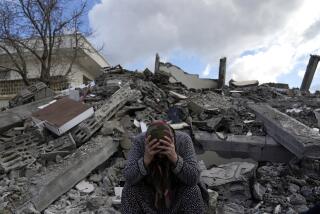Turmoil in Turkey Deflects Focus From Iraq
- Share via
ANKARA, Turkey — As a top U.S. defense official held talks here on a possible military strike against Iraq, such planning was complicated Tuesday when the political parties in the rapidly unraveling government of Prime Minister Bulent Ecevit agreed to hold early elections.
The ailing Ecevit had fiercely resisted calls to move parliamentary elections up from 2004 to November, but his hand was forced when further defections from his party reduced the government to controlling half the seats in parliament.
The political turmoil means that in the coming months it will be difficult for Turkish leaders to focus on a possible military conflict with neighboring Iraq.
Deputy Defense Secretary Paul D. Wolfowitz met with Ecevit and Turkish military brass for talks believed to have centered on a proposed U.S.-led effort to overthrow Iraqi President Saddam Hussein. Any such action would carry enormous risks for Turkey. But if successful, it could bring long-term economic and political benefits.
“Turkey has very large and legitimate interests in Iraq,” Wolfowitz said after meeting with Ecevit. “The United States has a very large concern for Turkey’s success. So it matters greatly to us what the Turkish perspective and views are.”
Political uncertainty is so great here that it is difficult to know whether the next Turkish government would support a U.S.-led effort against Iraq, which Washington says is developing weapons of mass destruction. Turkey’s participation is seen as crucial in part because the nation would be expected to provide use of its air bases.
Wolfowitz also met with Defense Minister Sabahattin Cakmakoglu and other top military officials, who in the Turkish system would have a strong voice on security decisions regardless of who is elected prime minister.
Cakmakoglu said Monday that Turkey did not “at this moment” approve of any U.S. attack on Iraq. “We respect Iraq’s territorial integrity, political unity and sovereignty,” state-run TRT television quoted him as saying.
Turkey is a member of the North Atlantic Treaty Organization. Its air bases are used by the U.S. and Britain to patrol a “no-fly” zone over northern Iraq where Hussein’s air force is not allowed to fly. The zone was established to protect ethnic Kurds in northern Iraq, who hold an area free from Iraqi government control.
President Bush last week renewed his administration’s commitment to ousting the Hussein regime, declaring he would use “all the tools” at his disposal. But he left open the prospect that something short of a second Persian Gulf War could achieve that goal.
Bush’s comments followed recent news leaks about a developing Pentagon plan for 250,000 U.S. troops to attack Iraq on three fronts. Defense officials and military analysts have cautioned that the plan is only one of perhaps a dozen circulating in the U.S. government.
Wolfowitz was joined at the talks here by Marc Grossman, a high-ranking State Department official who met recently with exiled Iraqi opposition leaders, and Air Force Gen. Joseph W. Ralston, NATO’s supreme commander.
Any effort to oust Hussein is unlikely this year, analysts say, because the predominantly Muslim nations that the administration wants in a coalition against Iraq are preoccupied by the Israeli-Palestinian conflict, and U.S. soldiers remain embroiled in Afghanistan. If an attack is launched next year, a new Turkish government could be in place soon enough to join in the planning.
Ecevit has expressed opposition to such an offensive, arguing that another war would have a devastating effect on the economy of Turkey, which is locked in its worst recession since 1945.
But some politicians here are willing to risk a battle with Iraq. Tansu Ciller, head of the opposition True Path Party, said recently, “I want to be the premier during a possible military action against Iraq.”
In any such conflict, Turkey would risk retaliation from its neighbor. In addition, if the campaign is successful, it could lead to greater autonomy, perhaps even independence, for the Kurdish population of northern Iraq. That region borders a part of Turkey that has a large Kurdish minority, and the government here fears that Turkish Kurds could be incited to make greater demands.
Wolfowitz sought to allay those fears Tuesday. “We’ve been very clear ... expressing our firm opposition to a Kurdish state in northern Iraq,” he said.
The decision to hold early elections followed a stream of defections from Ecevit’s Party of the Democratic Left.
Ecevit, 77, has suffered a range of ailments in recent months, including spinal problems and a cracked rib. He has been hospitalized several times and often has been unable to go to his office, prompting calls for his resignation.
Ecevit and his coalition partners--Devlet Bahceli, head of the Nationalist Action Party, and Mesut Yilmaz of the Motherland Party--met Tuesday and then issued a statement saying the three leaders had agreed to hold a general election Nov. 3.
More to Read
Sign up for Essential California
The most important California stories and recommendations in your inbox every morning.
You may occasionally receive promotional content from the Los Angeles Times.










